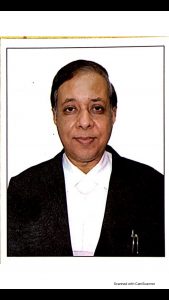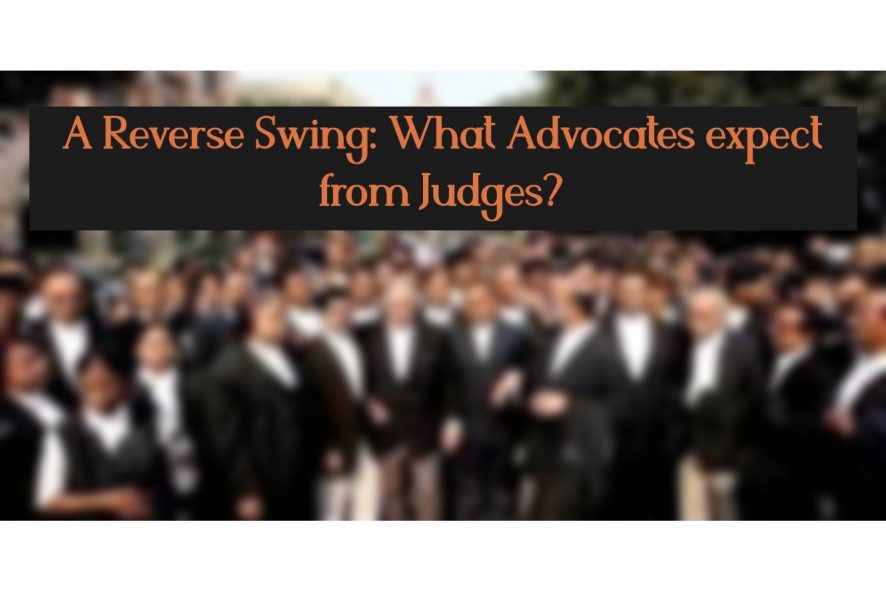In cricket, both for fast bowlers and medium-pacers mastering the art of reverse swing is crucial to ensure that they do not get booted out of their teams. In the same manner, in the legal field today, I am trying to explore this reverse swing with the hope that I may not get booted out.
There is a big list of advisory literature and lectures on the subject: “What Judges expect from lawyers”. However, there is hardly any direct and explicit view on vice versa i.e. ‘What advocates expect from Judges’. Although, it is customary in our system that Judges sitting higher on the Bench and having reins of majesty of law, their expectations should be given preference and more weightage, as dispensing justice is considered a more pious duty than the job of the advocates, who represent the litigants for their respective cases. No doubt, the lawyers are also the officers of the court and they always try to satisfy the litigants’ desire for justice by performing their legal duties, but in the legal world, consumers of justice are ignored much, than being recognised in its true perspective.
I am, however, attempting to address this issue based upon some experience I have. The Supreme Court of Canada has said: ‘The Judge is pillar of entire judicial system.’[1] This also applies in India. The great Socrates defined the four personal qualities of a Judge, which has become famous: ‘to hear courteously; to answer wisely; to consider soberly and to decide impartially’. All the same, Judges are also human beings and so, they are not free from any fallibility. Of course, it varies from Judge to Judge, but it is imperative to understand from an advocate’s standpoint of view that how s/he sees the Judge. What he/she expects from the Judge. The inner and outer expectations of the lawyers also differ within themselves and from junior or new entrant in the profession to a seasoned senior; hopes from the Judge/s are diverse in various categories. However, there are some general points, which all advocates want and wish from the judge to consider their case/s in the given set of facts and law. I have tried to summarise the same in the following manner without repeating those four things what Socrates had said above. However, these are only illustrative and not exhaustive at all.
- Advocates want Judges to allow them to develop their case a little bit more, even if it is a fresh matter for admission and the Judge has already read it in advance. Of course, some Judges hear patiently even if they know there is nothing in the matter, but some are impatient by themselves and before an advocate rises to address, it is determined as ‘dismissed’. Sometimes, advocates are aware of the weakness in their own cases, but because the law is not settled, they seek a fighting chance, as there are liberal Judges and there are strict Judges. Notions for issuing notice or not also have diverging views. Hence, there is nothing wrong, if an advocate could be heard for a little more time.
- Advocates wish that Judges should be open till the end of the matter and should not close their minds with preconceived notions. Many lawyers feel this thing in a variety of cases. However, there is no harm in changing the opinion even at a last moment, if ultimately there is a point to consider the matter. Open-mindedness is always better for just adjudication process.
- Moreover, one cannot change the facts, but by interpreting the law, relief can be molded in the interest of justice, equity and good conscience, as we have inherited it from the common law tradition. Hence, endeavour should be made to see that justice is done. Arguments and counter-arguments are not the game, which is played in the courtroom. The Bench should be concerned in finding out the truth and not to watch the performance of the lawyers, unlike a wrestling match. However, to discover the truth is the most difficult task for the Judge, as sometimes, truth is stranger than fiction and it is said: Fiction is obliged to stick to possibilities, truth isn’t.
- Advocates want and deeply wish for an equal treatment with all the members of the Bar/profession irrespective of their standing and status as senior counsel/advocate while addressing the courts. Junior members of the Bar hardly envy of status of senior counsel/advocate, as they have full respect for them and they know that seniors have earned it by sheer hard work and talent, but what pinch them is some special treatment by a certain Bench. Painfully, the Judges justify them by saying: they have a good point, which ordinary lawyer will not be able to see because they carve out from even from a dead horse. This is debatable and most of the members of the Bar would hardly agree with this, considering on the same point, a junior advocate is snubbed by the same court, wherein the senior counsel is entertained. Here, there is hardly any need to cite specific instances, as practicing advocates see this day in day out. Nevertheless, there is not an iota of grudge or any kind of resentment against the learned seniors of this noble profession, as they are always respected and torchbearers of this noble profession, who have set highest traditions and examples for new generation, but the point is: if other things being equal, similar treatment by the Bench is required to be given to all, of course fairly and justly.
- And last, but not the least is: behavior of the Judge, when s/he adorns the Bench. Judges do mark conduct of the advocates while they are arguing; in the same manner, the advocates are also noticing the behavior of the Judge, while he/she is hearing the case. Sometimes, advocates understand that due to heavy workload and unbearable backlog, Judges tend to be disturbed, perturbed and become agitated on the Bench and the lawyers tolerate this by keeping quiet or sometimes with smiling face. But, if this happens every day and the mood swings of the Bench, then, it makes difficult for the advocates to conduct the case as per their preparation of the matters.
In the Indian legal system, more particularly, in litigation, as soon as fresh advocates enter in the profession, first thing they learn is about the face-law. Some seniors used to say and sometimes they rightly say: before knowing the law, know your Judge. Meaning thereby, see and observe: how s/he deals with the case, in what manner and most importantly – what s/he likes and what s/he dislikes. Law is what, Judge says.
I conclude by citing the memorable words of great Judge Justice M.C. Chagala from his autobiography ‘Roses in December’, which I quote: “Discourtesy to the Bar is essentially evidence of weakness in the Judge. Losing one’s temper while counsel is arguing is a reflection only of the Judge’s own failing and his inability to control the Bar…’
*Advocate practicing at Gujarat High Court and Visiting Professor at Institute of Law, Nirma University, Ahmedabad
[1] The Canadian Superior Courts Judges Association, “The Qualities Required of a Judge” http://www.cscjaacjcs, (8 May, 2017)







An experienced emotional truth to be followed.
I FULLY AGREE WITH THE RESPECTED WRITER. HOWEVER THE ADVOCATES ARE COUNSELS OR ADVISORS TO THE HON’BLE JUDGES. SITTING ON THE HIGH PEDESTAL PER SE DOES NOT MEAN THAT THEY ARE DISPENSING A MORE SIGNIFICANT ROLE IN JUSTICE DISPENSING THAN COUNSELS/ ADVOCATES. BAR AND BENCH ARE EQUAL IN JUDICIAL SYSTEM.
Very Apt article. All d 5 points r absolutely relevant. I wish it is incorporated in Induction program of each judicial officer for their consumption n practicing thru out.